Kunst ist politisch
Kunst ist politisch.
Kultur ist politisch.
Kultur ist ein Spiegel der Zeit.
– Was kann Kunst und Kultur?
– Historische Betrachtung
– Wie gehen wir gesellschaftlich mit Kultur, Kreativen und unserer Zukunft um?
Kunst und Kultur hat die Möglichkeit politische Zusammenhänge auf vielfältigen Wegen, anders, vereinfachend, plastischer, begreiflicher zu erzählen.
Wir, als Einzelne, als Menschheit, sind mit einem Nachteil konfrontiert: Oft verstehen wir erst im Rückblick, dass oder wie politisch diese Werke waren oder wie die Bedeutung der Werke im Kontext ist.
Wie groß dabei die Wirkung und Einflussmöglichkeit von Kunst und Kultur auf Entscheidungsträger*innen ist? Nun, (vielleicht bzw. wahrscheinlich) nicht so stark, wie wir uns das wünschen würden. Aber: Kunst und Kultur wirkt auf die Gesellschaft, auf jede*n einzelne*n von uns.
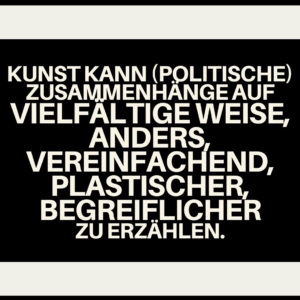
Was lehrt uns die Geschichte?
Machtmenschen, insbesondere Feinde der Demokratie nutzen gezielt jede (Un-)Möglichkeit, Kunst und Kultur in jeder noch so trivialen Form zu instrumentalisieren. Dieses Verhalten beobachten wir über Jahrhunderte hinweg. Bereits vor Jahrhunderte nutzte und benutzte die Kirche Kunstwerke, um das einfache Volk von der Strahlkraft einer Religion und eines Gottes zu überzeugen. Und – i mean, c‘mon: In einem Zeitalter voller Schinderei, Armut, Überlebenskampf, ohne Sanitäranlagen, ohne TV und SocialMedia ist das, was in Kirchen hängt, steht, liegt, die Architektur selbst einfach BÄM! Umwerfend, beeindruckend. Auch weltliche Herrscher (und ein paar Herrscherinnen) haben die Wirksamkeit der Kunst für sich und ihre Zwecke genutzt.
Was ist Kunst, was Kultur – also eigentlich?
Vor diesem Hintergrund – und gerade bei den aktuellen gesellschaftlichen und politischen Entwicklungen – müssen wir Kultur breiter begreifen. Es ist kurzsichtig als Literatur und Kultur nur wertzuschätzen, was den Stallgeruch des Intellektuellen verströmt, was in Feuilletons besprochen wird oder im Hardcover ausliegt oder sonstige scheinbare Weihen erhalten hat, in Museen hängt oder – weil einfach die besseren Connections – in hohen Häusern gelesen wird.
Den Kultur- und Literatur-Begriff so eng (wie leider in Deutschland) zu halten (auch im Hinblick auf Förderung und Finanzmittel) ist fatal, denn: Autokratische und faschistische Strömungen nutzen das gesamtkulturelle Angebot (von SocialMedia/youtube/tiktok/ you name it… über Zeitschriften über Bücher über Filme). Sie verbreiten antidemokratische, abwertende, hasserfüllte, spaltende Inhalte. Mit diesen Mitteln senden, säen sie aus und bringen in unsere Köpfe, normalisieren, legitimieren, ein hasserfülltes, einseitiges, diskriminierendes Weltbild. Von diesem werden nur einige wenige profitieren. (siehe hierzu Spiegel-Artikel zum Thema Desinformation von Christian Stöcker)
Der Einfluss auf Wahrnehmung und die Abbildung unserer Gesellschaft in allen kulturellen Formaten ist enorm – insbesondere auf das, was wir als „normal“ wahrnehmen und wie sich unsere Welt widerspiegelt. Wen ich dabei ein- oder ausschließe, also gendere oder ent-gendere ist dabei nur einer von vielen Aspekten. (Beispiel Gendern/Ent-gendern: Wenn ich von einer Gruppe von Ärzten schreibe, sind die ÄrztInnen in dieser Gruppe unsichtbar, selbst wenn es 99% oder 100% wären).
Es ist bzw. wird folgenreich – im negativen Sinne – sein, dass viele von uns den Gesamtkontext nicht sehen oder diesen schlicht ausblenden. Denn die, die diese Gesamtheit von Werkzeugen begreifen, die Kultur und Kreatives schaffen können, nutzen diese für ihre Zwecke.
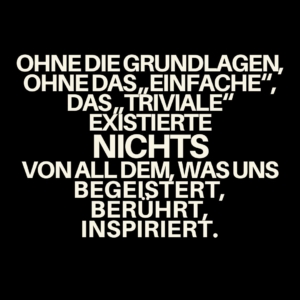
Was bedeutet das für unser Verständnis von Kultur und Kunst?
Wir müssen Kultur und Literatur und unser Verständnis davon viel breiter und offener fassen und in deren gesamten Fülle und allen Erscheinungsformen wahrnehmen und annehmen, d.h. jegliche Formen von Gestaltungsmöglichkeit aka Output, die Menschen erreichen und deren Gedanken und Haltung beeinflussen kann – zum Guten, zum Schlechten.
Was bedeutet das im Hinblick auf unsere Zukunft …
… mit generativer KI:
Generative KI ist algorhitmus-basiert und dient dem Zweck, die für Nutzer*innen wahrscheinlichste, befriedigendste Antwort zu liefern. Das bedeutet: Generative KI ist nicht darauf programmiert KORREKTE Antworten zu liefern.
Eine Gefahr ist hier: Generative KI ist ein unfassbarer Multiplikator von Inhalten, der zunächst mal auf der Ausbeutung von Werken überhaupt erst existiert. Generative KI kann benutzt werden und wird z.T. auch so benutzt, um propagandistische Inhalte und Fake-News in einer weit größeren Reichweite, viel schneller zu verbreiten.
Eine weitere Gefahr:
Eine Maschine übernimmt unsere Aufgaben. Wie sollen und können und wollen wir noch Fertigkeiten erlernen, wie sollen wir uns weiterentwickeln? Wenn eine Maschine kuratiert, welche Inhalte wir lesen, welche Optionen die wahrscheinlichsten sind, wie gelingt uns, selbst noch einschätzen zu können, was wirklich wahr und richtig ist, und was fake ist?
Auch hier zeigt die Geschichte: Menschen sind bequem und suchen den einfachsten Weg, Ziele zu erreichen. Über Jahrhunderte haben wir grundlegende Fertigkeiten verlernt. Natürlich haben wir uns dafür andere angeeignet. Aber im Hinblick auf KI ist eine der Gefahren, dass wir uns ent- und de-qualifizieren. Hierzu mehr im Interview mit dem Literaturportal.
… als Gesellschaft?
Gesellschaftlich, politisch, strukturell muss gelingen, dass alle, die Kultur erschaffen, finanziell unabhängig sind, um sich nicht instrumentalisieren lassen zu müssen. Nur so bleiben die Räume offen für eine Vielfalt in unserer Gesellschaft. Kreative und wir alle benötigen Sicherheit in diesen und für diese Räume, finanziell und strukturell. Denn selbst wenn es ist, wie es immer ist, dass Menschen Ziele verfolgen, deren Ergebnis Selbstbereicherung ist und anderen zu schaden. Selbst wenn sich in diesem Fall Menschen instrumentalisieren lassen für Propaganda und Spaltung und Hass, dann existiert – hoffentlich – noch immer eine Vielzahl freier Geister und Gestalter*innen.
Wir brauchen Sicherheit und Stabilität, damit auch in den folgenden Generationen Menschen mit freien, frischen Ideen Kultur, Kunst, Literatur, Kreatives schaffen können und wollen.
Vor allem muss jede*r mit einem ersten Versuch und vielen Fehlern anfangen können und anfangen wollen. Die ersten Schritte/Stücke/Schriften/Bilder von Kulturschaffenden sind selten Meisterwerke. Damit wir Außerordentliches entwickeln, müssen wir das „Einfache“ ebenso achten und fördern. Zudem müssen wir den Prozess anerkennen und berücksichtigen, sowie den Erkenntnisgewinn und die Weiterentwicklung, die überhaupt erst entstehen, WEIL wir Fehler machen (können) und aus diesen lernen.
Ohne die Grundlagen, ohne das „Einfache“, das „Triviale“ existierte nichts von all dem, was uns begeistert, berührt, inspiriert.
Aber: Wer wollte sich die Arbeit noch machen? Wer kann sich leisten das zu tun?
Dass kein Mensch mehr in der Lage ist, Kreatives zu schaffen, ist wie oben erwähnt eben auch eine der großen Gefahren von generativer KI.
Möglichkeiten?
Wie gelingt uns als Gesellschaft, Kulturschaffende zu schützen – vor der Ausbeutung von kapitalstarken Playern, vor generativer KI – und Kreative so (finanziell) unabhängig zu halten, dass diese Kunst u Kultur u Unterhaltung frei und vielfältig schaffen können, ohne sich instrumentalisieren lassen zu müssen, damit Miete u Essen u Leben leistbar sind?
Ein Weg – definitiv: Faire Bezahlung, Kreative angemessen zu vergüten. Wir alle genießen und konsumieren Kunst und Kultur, wir wollen nicht leben ohne. Ehrlich: Ein Leben OHNE Kunst und Kultur ist ARM. Für die Entwicklung von KI wurden Arbeiten geklaut. Große, reiche, einzelne Tech-Unternehmen und deren nicht ganz arme Manager*innen werden dadurch noch reicher werden. Ein Anfang wäre: mindestens für jene Arbeiten zu bezahlen.
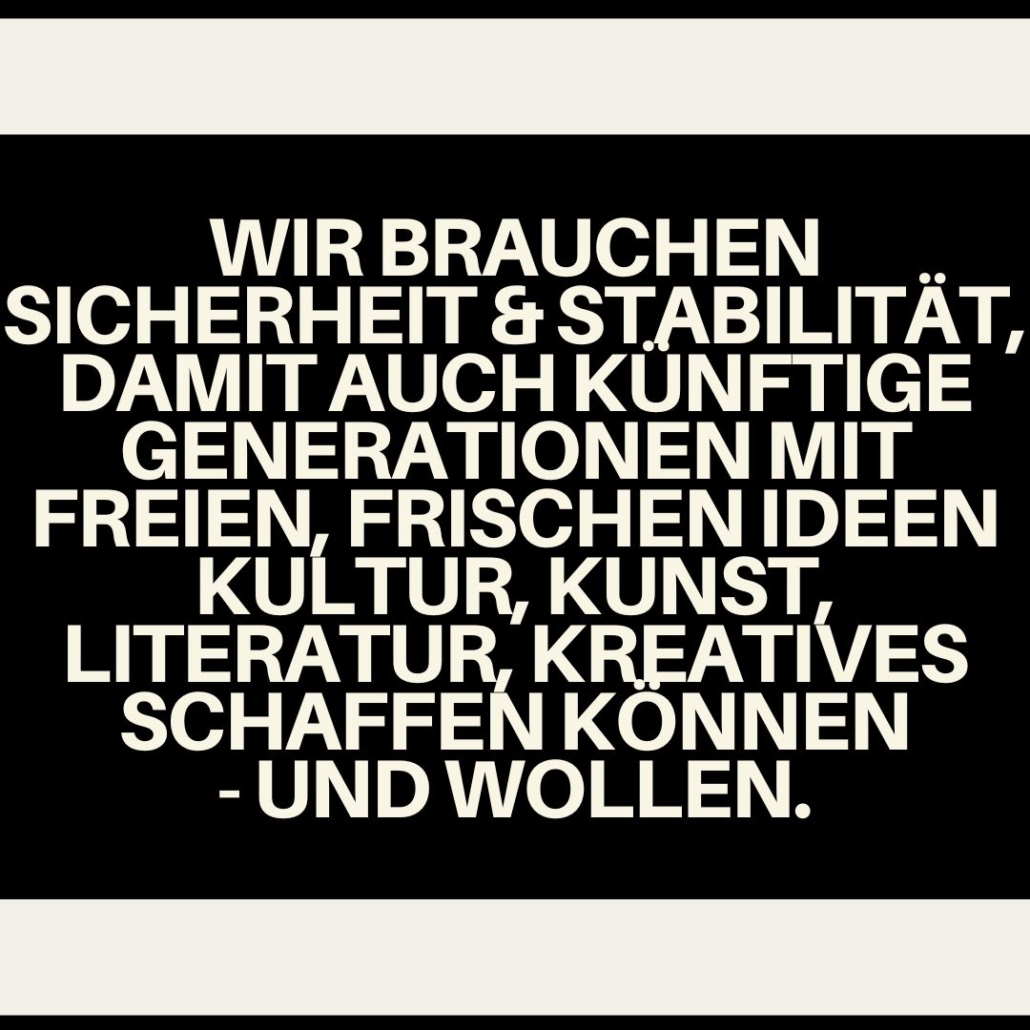
Art is political.
Culture is political.
Culture is a mirror of times.
– What‘s the impact of art and culture?
– Historical reflection
– How do we deal as society with culture, creative people and our future?
Art and culture have the ability to explain political contexts in many different ways, in a different, simplified, more vivid, more comprehensible way.
We, as individuals, as humanity, are confronted with a disadvantage: we often only understand in retrospect that or how political these works were or what the meaning of the works is in context of its (political and societal) influences.
How big is the impact and influence of art and culture towards decision-makers? Well, (perhaps or probably) not as much as we would like it to be. But: art and culture reach out to society and have an impact on each and every one of us.
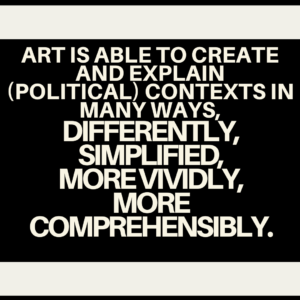
What is history teaching us?
Coming from this background – and especially in sight of current social and political developments – we need to understand culture in a wider range. It is short-sighted to value literature and culture only in terms of what exudes the intellectual’s stable odour, what‘s discussed in feuilletons or displayed in hardcovers or has received other apparent consecration, is shown in museums or – simply because it has better connections – is to be read in „high places“.
It is fatal to keep the concept of culture and literature as narrow as is unfortunately the case in Germany, also in regard of funding and financial resources. Autocratic and fascist movements do and will not hesitate to use the entire cultural offer (from social media/youtube/tiktok/you name it… to magazines to books to films). They spread anti-democratic, derogatory, hateful and divisive content. With these means they broadcast, sow and bring into our heads, normalise, legitimise, a hateful, one-sided, discriminatory world view. Only a few will benefit from this.
The influence on perception and the depiction of our society in all cultural formats is enormous – especially on what we perceive on how our world is reflected and what we (start to) see as „normal“. Only one of many aspects is who will I include or exclude verbally via the concept of neutral or including descriptions of personae, i.e. If I write about a group of doctors, the female doctors in this group are invisible, even if the women or other gender in this group were 99% or 100%).
It is or will be consequential – in a very negative way – that many of us do not see the overall context or simply ignore it. Because those who understand this totality of tools that can create culture and creativity use them for their own purposes.
What does this mean for our understanding of culture and art?
We need to take in a much broader and more open view of culture and literature and widen our understanding of them, perceiving and accepting them in all their variety and in all their manifestations, i.e. all forms of creative possibility aka output that can reach people and influence their thoughts and attitudes – for better or for worse.
What does this mean in terms of our future …
… with generative AI:
Generative AI is an algorithm-based machine and serves the purpose of providing the most likely, most satisfying answer for users. This means: Generative AI is not programmed to provide CORRECT answers.
And exactly in being aware – or mostly not-aware – is a danger: Generative AI is an intangible multiplier of content that exists in the first place on the exploitation of works. Generative AI can be used, and in some cases is used, to spread propagandistic content and fake news much faster and with a far greater reach. And as we tend to trust „the machine“ we open up ourselves to be manipulated.
Another danger:
A machine aka generative AI takes over our tasks. How should and can and do we still want to learn skills? how should we continue to develop? If a machine curates what content we read, which options are the most likely, how can we still manage to judge for ourselves what is really true and correct and what is fake?
Here, too, history shows that people are comfortable and look for the easiest way to achieve their goals. We have already unlearnt basic skills over the centuries. Of course, we have acquired others. But with regard to AI, one of the dangers is that we are de-qualifying ourselves.
… as a society?
Socially, politically and structurally, everyone who creates culture has to be financially independent (in best case scenario: everyone ever should be financially stable and independent and not threatened by poverty). That’s a way to prevent artist from being instrumentalised. This is the only way to keep the spaces open for diversity in our society. Creatives and all of us need security in and for these spaces, financially and structurally. Because as is always the case, people pursue goals that result in self-enrichment and harm others. Even if, in this case, people allow themselves to be instrumentalised for propaganda and division and hatred, there are – hopefully – still a large number of free spirits and creators who stand up for others, for diversity, for democracy.
We need security and stability so that people with free, fresh ideas, for peopZ who can and want to create culture, art, literature and creativity in future generations.
Above all, everyone must have the chance and the will/urge to start with a first attempt and many mistakes. The first steps/pieces/writings/images of creative artists are rarely masterpieces. In order to develop something extraordinary, we must also respect and promote the „simple“. We must respect and acknowledge the process and that learnings and achievements are gained via mistakes. Without the basics, without the „simple“, the „trivial“, none of the things that excite, touch and inspire us would exist.
But: Who would want to do the work? Who can afford to do it?
As mentioned above, the fact that people are no longer able to create something creative is also one of the great dangers of generative AI.
Possibilities?
How can we as a society succeed in protecting creative artists – from exploitation by financially strong players, from generative AI – and keeping creative artists (financially) independent so that they can create art, culture and entertainment freely and in a variety of ways without having to allow themselves to be instrumentalised so that rent, food and life are affordable?
One way – definitely: fair payment, appropriate remuneration for creative people. We all enjoy and consume art and culture, we don’t want to live without it. Honestly: A life WITHOUT art and culture is POOR. Work has been and is stolen for the development of AI. Large, rich, individual tech companies and their not-so-poor managers will become even richer as a result.
A start would be to at least pay for those works.

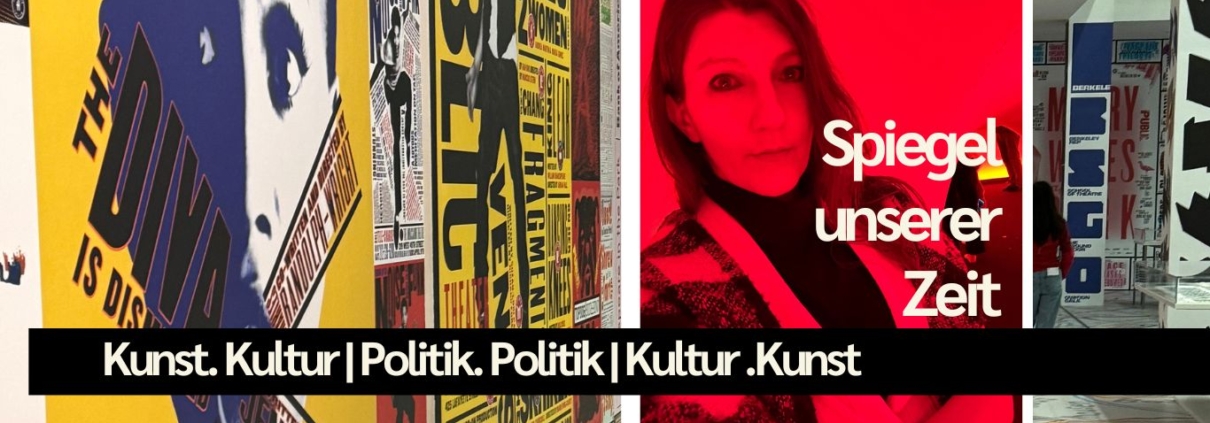 Monika Pfundmeier
Monika Pfundmeier Raimund Verspohl
Raimund Verspohl Raimund Verspohl
Raimund Verspohl